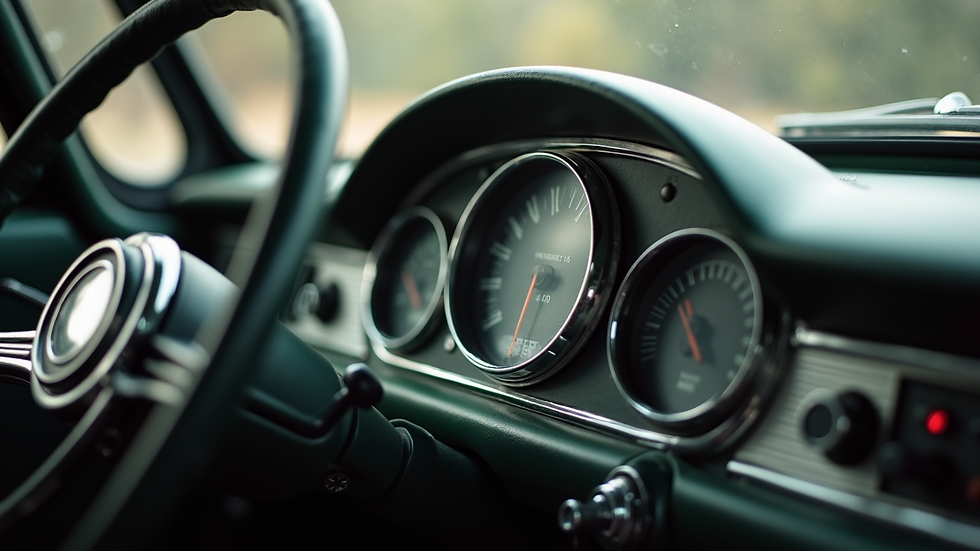Understanding the Importance of Classic Car Inspections
- Shawn Owens
- Oct 7, 2025
- 4 min read
Owning a classic car is more than just having a vehicle - it is about preserving a piece of history. Classic cars represent craftsmanship, style, and nostalgia. However, maintaining their value and ensuring their safety requires more than just passion. This is where classic car evaluations and inspections come into play. They provide essential insights into the condition, authenticity, and worth of these timeless vehicles.
Why Classic Car Evaluations Matter
Classic car evaluations are critical for anyone who owns or is interested in purchasing a vintage automobile. These evaluations assess the car’s condition, originality, and market value. They help owners make informed decisions about maintenance, restoration, and insurance.
Accurate Valuation: Knowing the true value of a classic car helps in setting the right price for sale or insurance purposes.
Restoration Guidance: Evaluations identify which parts need restoration or replacement, preserving the car’s originality.
Investment Protection: Classic cars can appreciate in value, but only if they are well-maintained and documented.
Market Insight: Understanding trends in classic car values helps buyers and sellers negotiate better deals.
For example, a 1965 Ford Mustang in excellent condition with original parts will have a significantly higher value than one with aftermarket modifications or rust damage. A professional evaluation highlights these differences clearly.

The Process of Classic Car Evaluations
A thorough classic car evaluation involves several steps. Experts examine the vehicle inside and out, checking for authenticity, condition, and any signs of wear or damage.
Exterior Inspection: The bodywork, paint, chrome, and glass are inspected for rust, dents, and originality.
Interior Check: Seats, dashboard, carpets, and headliner are reviewed for wear and matching original specifications.
Mechanical Assessment: Engine, transmission, brakes, and suspension are tested for functionality and originality.
Documentation Review: Service records, ownership history, and any restoration paperwork are verified.
Market Comparison: The car’s features and condition are compared with similar models currently on the market.
This detailed process ensures that the evaluation is comprehensive and reliable. It also helps identify any hidden issues that could affect the car’s value or safety.
Is a Classic Car 20 or 25 Years Old?
One common question among enthusiasts is the age at which a car qualifies as a classic. The answer varies depending on the organization or region, but generally:
20 Years Old: Some clubs and insurance companies consider a car classic once it reaches 20 years. This is often the minimum age for special insurance rates or club memberships.
25 Years Old: Many classic car registries and appraisal experts use 25 years as the benchmark. This age is widely accepted for official classic car status and eligibility for certain events or tax benefits.
Understanding this distinction is important when planning your car’s maintenance, insurance, and participation in classic car shows. For example, a 1999 model would be considered classic by the 20-year standard in 2019, but only by the 25-year standard in 2024.

The Role of a Classic Car Inspection
A classic car inspection is a specialized evaluation focusing on the vehicle’s condition and authenticity. Unlike a general inspection, it requires expertise in vintage automobiles and knowledge of original specifications.
Safety Check: Ensures brakes, tires, lights, and other critical systems are functioning properly.
Authenticity Verification: Confirms that parts and components match the car’s original build.
Damage Assessment: Identifies any hidden rust, frame damage, or previous repairs.
Maintenance Recommendations: Provides advice on necessary repairs or preventive care.
For example, a classic car inspection might reveal that a seemingly perfect paint job is actually covering rust damage. This information is crucial for buyers and sellers to avoid costly surprises.

Tips for Maintaining Your Classic Car’s Value
Maintaining a classic car’s value requires ongoing care and attention. Here are some practical tips:
Regular Cleaning: Keep the car clean and waxed to protect the paint and chrome.
Proper Storage: Store the car in a dry, climate-controlled environment to prevent rust and deterioration.
Use Original Parts: Whenever possible, use original or period-correct parts for repairs and restoration.
Keep Documentation: Maintain detailed records of all maintenance, repairs, and inspections.
Drive Carefully: Avoid harsh driving conditions and excessive mileage to preserve the car’s condition.
By following these steps, owners can ensure their classic cars remain in top shape and retain their value over time.
Planning for Classic Car Insurance
Insurance for classic cars differs from regular auto insurance. It often requires proof of the car’s value through evaluations and inspections. Specialized policies may offer:
Agreed Value Coverage: The insurer and owner agree on the car’s value upfront.
Limited Mileage: Policies may limit annual mileage to reduce risk.
Storage Requirements: Insurers may require secure storage when the car is not in use.
Getting a professional evaluation and inspection report can simplify the insurance process and help secure the best coverage.
Final Thoughts on Classic Car Evaluations and Inspections
Classic car evaluations and inspections are essential tools for preserving the legacy and value of vintage automobiles. They provide peace of mind for owners, buyers, and sellers by ensuring transparency and accuracy. Whether you are investing in a classic car or maintaining one you already own, professional evaluations and inspections are invaluable.
Taking the time to understand your car’s condition and market value will help you make smarter decisions and enjoy your classic car for years to come. Remember, a well-maintained classic car is not just a vehicle - it is a cherished piece of automotive history.




Comments